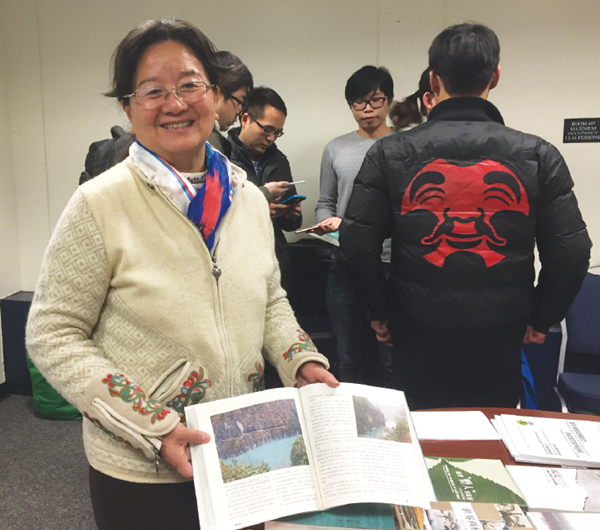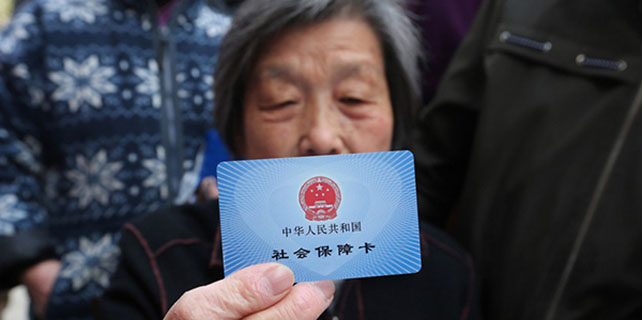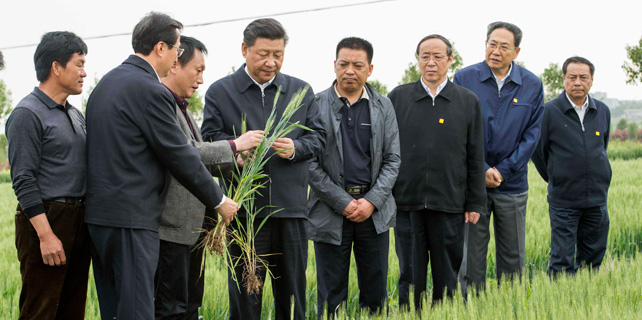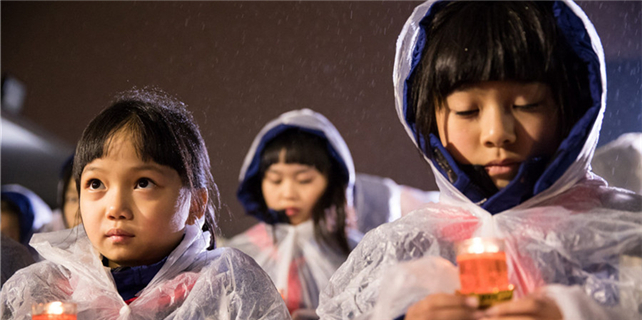Saving rivers one step at a time
 |
|
Wang Yongchen, founder of China's Green Earth Volunteers (GEV) and senior environmental journalist for the China National Radio, presents her books about GEV's efforts to protect China's Nujiang River on Tuesday in Washington. Yuan Yuan / For China Daily |
China's rivers have a friend in Wang Yongchen.
Wang, founder of China's Green Earth Volunteers (GEV) and senior environmental journalist for the China National Radio, was invited by the International Fund for China's Environment (IFCE) to discuss the environmental stress on China's river system on Tuesday in Washington.
Wang had just been named a Foreign Policy magazine Global Thinker Steward, along with a group of people the citation called "the sort of preservationists the world desperately needs."
Wang had no idea the honor was coming and was taken completely by surprise.
"I don't even know how they were able to get my photo," she said.
In the photo, she is lying on the ground recording the sound of the Nu River's waters flowing by.
Wang is a close friend of many rivers in China, especially the Nujiang River, which she has visited 17 times over the past 14 years in an effort to protect it from human activity.
The Nujiang River, which flows from the Tibetan Plateau and becomes the Salween in Myanmar and Thailand, is one of China's last free-flowing rivers. Although its valleys preserve the traditional lifestyles of several of China's ethnic minorities and are home to some of the most ecologically diverse habitats on the planet, the Nujiang River has been a proposed site for multiple dams over the past decade.
Founded 20 years ago as an environment-targeted non-governmental organization (NGO), GEV has trended with the emerging environmental movement in China, initiating several landmark green activities.
In 2006, Wang launched Ten Years Rivers Visiting, GEV's 10-year project aimed at continuously monitoring six major rivers in southwest China through annual field trips by environmentalists, journalists and members of other NGOs.
The researchers also tracked 10 riverside families to assess what impact changes in the rivers had on their lives.
In 2013, after GEV brought national attention to the polluted "milk river" in southwest Yunnan province, the local government held a press conference to apologize and hold more than 20 companies accountable.
Her latest battle started when plans to construct dams on the Nujiang River were revisited in recent years as part of China's move toward more sources of renewable energy.
Wang fought back contacting China's National Energy Board. In March, provincial officials instead proposed a national park along the river, saving the free-flowing Nujiang — at least for now.
The threat that the river is facing may not be apparent to everyone at this moment. "Some might think: Who cares? But they don't realize that the developmental plans are irreversible," Wang said. "Once it's gone, it's gone forever."
Wang said there are regulations to protect rivers, but the biggest problem lies in enforcement.
"My work is not unrequited," Wang said. "I get at least three types of happiness: happiness from connecting with the nature, from self-fulfillment and from working with so many like-minded people."
She said she is positive about the future of environmental protection in China.
"The current environmental problems in China, though severe, are still within a controllable range. And President Xi has declared that we will no longer plan on any large-scale development over the Yangtze River," she said.
She is also a big believer in small steps made by individuals.
"I may not have the answer on how to change the whole situation, but I can tell you this: Japan's leading specialist in Minamata disease, whom I once interviewed, is now working in a small rehabilitation center; some of Indian's most established academics are promoting rural library projects. We've got to start with small changes and take one step at a time," she said.
Her organization follows the same philosophy, starting with small projects that eventually have a big impact.
"Each NGO may only be focusing on one subject or area, so we need platforms to be able to exchange ideas and keep each other updated on what we are doing," Wang said.
Yuan Yuan in Washington contributed to the story.
















